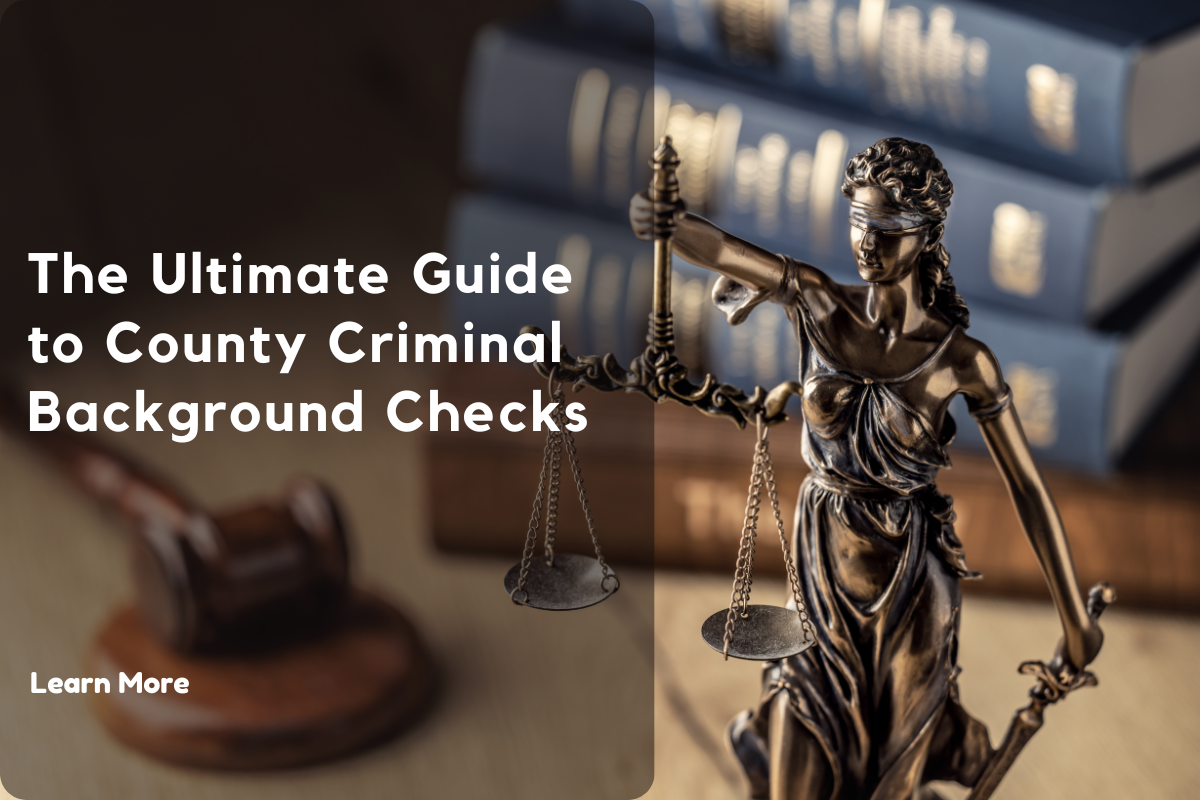 Introduction to County Criminal Background Checks
Introduction to County Criminal Background Checks
When it comes to criminal background checks, there are several methods for obtaining information about an individual’s criminal history. One such method is the county criminal background check, which focuses on criminal records maintained at the county level. These checks are an essential part of employment screening, housing applications, and other regulatory processes. Understanding what a county criminal background check is, how it differs from state and federal background checks, and the types of records it includes is crucial for both employers and individuals seeking to better understand the criminal history verification process.
What is a County Criminal Background Check?
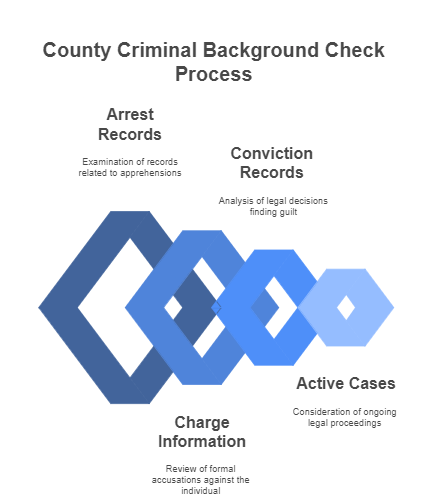
A county criminal background check refers to a search of an individual’s criminal history within a specific county. This type of background check focuses solely on criminal activity that has occurred within that county, and the records are typically maintained by the local court system or county law enforcement agencies. County criminal background checks typically examine a variety of criminal records, including:
- Arrests: Records related to individuals who were apprehended by law enforcement.
- Charges: Information about criminal offenses that an individual has been formally accused of committing.
- Convictions: Legal decisions that find an individual guilty of a crime after a court trial.
- Active Cases: Ongoing legal proceedings in which an individual is involved, such as charges pending trial.
These checks are often more localized and precise than state or federal checks, as they focus only on criminal records that are specific to the county where the check is conducted.
How Does a County Criminal Background Check Differ from State and Federal Checks?
While county criminal background checks focus on a specific jurisdiction, state and federal checks involve a broader scope. The differences between county, state, and federal background checks can be outlined as follows:
| Type of Background Check | Scope | Jurisdiction | Typical Records Included |
|---|---|---|---|
| County Criminal Check | Local jurisdiction (county level) | Specific to a county | Arrests, convictions, active charges |
| State Criminal Check | Statewide | Covers entire state | Statewide arrests, convictions, and offenses |
| Federal Criminal Check | National (federal level) | Covers the entire U.S. | Federal offenses, crimes that cross state lines |
- County Criminal Background Check: This check looks for records that are local to the county in question. It’s valuable for employers or organizations that are conducting background checks on people who reside or work within a specific county. For instance, if a person is applying for a job in a particular county, an employer might conduct a county check to assess the person’s criminal history in that local jurisdiction. It can also provide more specific and relevant information about crimes that have occurred in the area.
- State Criminal Background Check: Unlike county checks, a state criminal background check involves looking up criminal records that cover the entire state. While this check is broader, it may not provide as much granular detail as a county-level check. In some cases, certain local crimes may not appear in a state-level search, especially if those crimes occurred at the county level.
- Federal Criminal Background Check: This check searches for criminal records at the national level and focuses on crimes that violate federal law, such as interstate fraud, drug trafficking, and terrorism. While this check is comprehensive, it only covers offenses that are prosecuted at the federal level, leaving out state and county violations.
The Importance of County Criminal Background Checks
County criminal background checks are crucial because they offer a more localized and detailed view of an individual’s criminal history. Employers, landlords, and licensing agencies often use county checks to make informed decisions about candidates and applicants. Here’s why county criminal background checks are so important:
- Thoroughness: County criminal background checks provide detailed information about crimes that may not show up in state or federal checks. For instance, if an individual was arrested for an offense in a specific county, that information may not be included in a state or federal check, but it would show up in a county criminal check.
- Local Relevance: Since county background checks focus on a specific jurisdiction, they are highly relevant for local employers, housing authorities, and other organizations that need to ensure that candidates meet community standards. For example, if an individual has a criminal history in a particular county, it could indicate a higher risk for positions involving direct contact with vulnerable populations in that area.
- Accurate Records: In many cases, county courts maintain detailed records that are more accurate and up-to-date than the broader databases used in state or federal checks. Local court systems may have the latest information on arrests, convictions, and pending charges, providing a clearer and more reliable picture of an individual’s criminal history.
- Cost-Effectiveness: County criminal background checks can be less expensive than broader state or federal checks because they are more specific in scope. Organizations that only need information about criminal activity within a particular county can opt for a county-level check to save on costs while obtaining relevant data.
How County Criminal Background Checks Are Conducted
County criminal background checks are generally conducted by accessing records from local courthouses, county law enforcement agencies, or third-party background screening services. Here’s an overview of how a typical county criminal background check is carried out:
- Obtaining Permission: To conduct a county criminal background check, the employer, housing provider, or licensing agency must first obtain the applicant’s permission. This is essential to comply with laws governing background checks, such as the Fair Credit Reporting Act (FCRA).
- Searching County Records: Once permission is granted, the next step is to search the specific county’s court records. Many counties have public databases that can be accessed online, but some may require individuals to visit the courthouse in person to obtain this information.
- Verification of Information: After accessing the relevant criminal records, the next step is to verify the individual’s information. This usually involves matching the person’s name, date of birth, and other identifiers to ensure the records belong to the right individual.
- Generating a Report: Finally, the results are compiled into a report. This report typically includes details of any criminal offenses the individual has been involved in within the county’s jurisdiction. Depending on the scope of the search, the report may cover arrests, convictions, and pending charges.
Types of Records Found in County Criminal Background Checks
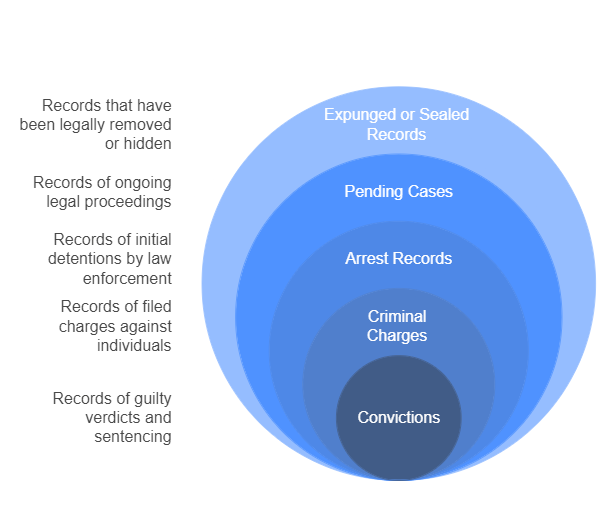
County criminal background checks often contain the following types of records:
- Arrest Records: Arrest records show that a person was detained by law enforcement for a suspected criminal activity, even if they were not convicted.
- Criminal Charges: If charges were filed against an individual, they would be listed in the county’s records. These charges could be for any criminal offense ranging from misdemeanors to felonies.
- Convictions: If the individual was found guilty of a criminal offense, the conviction would be recorded in the county’s court system. This could include details about the crime, sentencing, and any punishment or restitution imposed by the court.
- Pending Cases: In some cases, there may be information about cases that are still pending or under investigation. These records will indicate the status of ongoing legal proceedings.
- Expunged or Sealed Records: In certain cases, an individual may have a criminal record expunged or sealed by the court. County criminal background checks should not include expunged records; however, some counties may still include such records depending on local laws.
Key Features of County Criminal Background Checks
To better understand county criminal background checks, here’s a breakdown of their key features:
| Feature | Details |
|---|---|
| Jurisdiction | Focuses on a specific county’s court records |
| Scope of Information | Typically includes arrests, charges, convictions, and dispositions |
| Process | Involves searching local court databases and records |
| Accuracy | Provides highly accurate local information compared to state/federal |
| Limitations | May not include federal crimes or convictions in other jurisdictions |
How County Criminal Background Checks Impact Employment and Other Sectors
County criminal background checks play a vital role in various sectors, particularly in employment and housing. These checks provide specific insights into an individual’s criminal history within a certain county, offering a high level of accuracy for decisions made at the local level. By focusing on county-specific data, employers, landlords, and other organizations can ensure they are making well-informed decisions while adhering to the law. This section explores how county criminal background checks are used in employment screening, their importance in housing applications, and their role in other sectors such as licensing for certain professions. We’ll also discuss how Rapid Hire Solutions helps organizations navigate these checks effectively.
How County Criminal Background Checks Impact Employment Screening
County criminal background checks are commonly used by employers to screen candidates during the hiring process. Employers want to ensure that the individuals they hire do not have a criminal history that could pose a risk to their organization or violate company policies. These checks are especially important for positions that involve working with vulnerable populations, handling sensitive information, or managing finances.
Advantages of County Criminal Background Checks in Employment Screening
- Accuracy: County criminal checks offer a detailed and up-to-date view of an applicant’s criminal history within a specific jurisdiction. Since county records are often more current than state or federal databases, they help provide a more accurate representation of an individual’s past criminal activity.
- Thoroughness: By focusing on a particular county, employers can gather more relevant and localized information. For example, if a candidate has been arrested or convicted of a crime within a specific county, that information is less likely to appear in a state or federal background check, especially if the crime was local. A county check ensures that nothing is overlooked.
- Cost-Effectiveness: For employers that only need to check an applicant’s criminal history within a particular county, a county background check can be more affordable than running a broader state or federal check. This can help companies save money while still obtaining valuable information.
- Compliance with Local Laws: Many states and counties have their own specific laws regarding what can and cannot be used in employment decisions. For example, certain criminal offenses may not be permissible to consider in hiring decisions in some counties. A county criminal check ensures compliance with these local laws, reducing the risk of potential legal issues.
Types of Employment Roles That Benefit from County Background Checks
Certain types of roles are more likely to require county criminal background checks due to the nature of the position or industry. Some of these include:
- Healthcare Professionals: For positions such as nurses, doctors, and caregivers, a county check can ensure the safety of patients and comply with health regulations.
- Education: Teachers, school administrators, and daycare workers are often required to pass background checks to ensure the safety and well-being of children.
- Financial Services: For roles that involve handling money, banking, or financial transactions, employers may use county background checks to screen for financial crimes, such as embezzlement or fraud.
- Government Employees: Local government positions often require county-level checks to ensure the candidate’s criminal record aligns with the duties of the job.
- Security and Law Enforcement: For positions requiring access to sensitive or classified information, a county criminal background check is a crucial part of the vetting process.
County Criminal Background Checks in Housing and Rental Applications
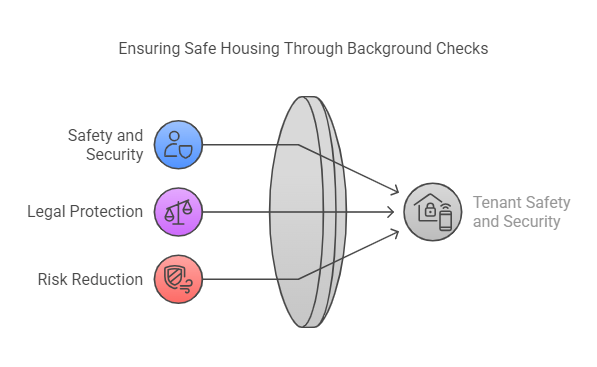
County criminal background checks are also commonly used in the housing sector, particularly by landlords and property management companies when screening tenants. These checks help property owners assess whether an applicant has a history of criminal activity that could affect the safety and security of the property or other tenants.
Importance in Housing Applications
- Safety and Security: Landlords and property managers have a responsibility to ensure that their properties remain safe for all tenants. By conducting a county criminal background check, they can screen for any violent offenses, drug-related charges, or other criminal activities that might indicate a potential threat to the community.
- Legal Protection: Many local laws govern the rights of tenants and the responsibilities of landlords, including how criminal history can be considered in housing decisions. Some cities or counties have adopted ban the box laws, which restrict the use of criminal records in housing decisions. However, landlords can still use county background checks to evaluate applicants as long as they are in compliance with these regulations.
- Reduces Risks: Screening tenants through a county criminal check allows landlords to mitigate risks associated with renting to individuals who may pose a safety hazard or have a history of criminal behavior.
How Landlords Use County Criminal Background Checks
Landlords typically use county criminal background checks to look for offenses that could affect their property or their other tenants. Common issues that landlords look for include:
- Violent Crimes: Assault, battery, domestic violence, or murder charges could signal a potential risk to other tenants.
- Property Crimes: Theft, burglary, and vandalism charges might indicate an individual could pose a threat to the property.
- Drug Offenses: Possession or distribution of illegal substances could be a concern, especially for multi-unit housing situations.
County Criminal Background Checks in Licensing for Professions
Certain professions require individuals to hold specific licenses or certifications. County criminal background checks play a crucial role in ensuring that those seeking to work in certain fields are not involved in criminal activities that would disqualify them from obtaining a license. Here are some examples of industries where county criminal background checks are critical:
- Real Estate: Real estate agents, brokers, and property managers must pass background checks as part of the licensing process in many jurisdictions.
- Legal Professions: Attorneys and paralegals are often required to submit to county criminal background checks to assess their fitness to practice law.
- Financial Advisors: Those working in the financial sector, including brokers and financial planners, often need a clean background check as part of their licensing process.
- Healthcare: Many healthcare professionals, including nurses and physicians, must undergo county criminal background checks as part of the licensing process to ensure the safety of patients.
How Rapid Hire Solutions Can Help
Navigating the complexities of county criminal background checks can be a challenging task for employers, landlords, and other organizations, especially when considering varying local regulations, jurisdictional differences, and compliance requirements. Rapid Hire Solutions helps employers and organizations streamline the background screening process by providing services tailored to the specific legal requirements of each county.
Rapid Hire Solutions offers expertise in navigating the nuances of county criminal checks, ensuring that employers and organizations comply with local laws and regulations. Their services include:
- Accurate and Up-to-Date Reports: Rapid Hire Solutions ensures that all background checks are conducted with the most current data available, reducing the risk of errors or outdated information.
- Compliance Assistance: With a deep understanding of local, state, and federal laws, Rapid Hire Solutions helps organizations stay compliant with regulations related to employment screening, housing, and professional licensing.
- Customizable Screening Packages: They offer customized screening packages to fit the specific needs of employers, landlords, and other organizations, ensuring the right checks are made based on industry requirements and legal obligations.
County Criminal Background Check Comparison: County vs. State vs. Federal
To better understand the distinction between county, state, and federal criminal background checks, here’s a comparative breakdown:
| Factor | County Criminal Check | State Criminal Check | Federal Criminal Check |
|---|---|---|---|
| Scope | Specific to a county’s jurisdiction | Covers the entire state | Covers the entire U.S. |
| Records Included | Arrests, charges, convictions within the county | Arrests, charges, convictions within the state | Federal offenses and crimes across state lines |
| Local Relevance | High, as it focuses on local criminal activity | Moderate, covers state-wide activity | Low, only federal crimes and cases |
| Accuracy | Typically more accurate for local data | Broader, may miss county-specific data | Only includes federal crimes and cases |
we’ve explored the crucial role of county criminal background checks in various sectors, including employment, housing, and professional licensing. County checks offer accuracy, thoroughness, and local relevance, making them an essential tool for decision-makers. Employers, landlords, and licensing agencies can rely on county-level data to make informed choices while ensuring compliance with local regulations. Additionally, Rapid Hire Solutions plays an important role in helping organizations navigate the complexities of county criminal background checks, offering expertise in compliance and accuracy.
Legal Aspects, FAQs, and Conclusion
County criminal background checks serve an essential purpose in various sectors, but they are also governed by several important legal considerations. Understanding these laws and regulations ensures compliance, protects individuals’ rights, and helps organizations make responsible and fair decisions. This section will focus on the legal aspects surrounding county criminal background checks, address common issues, answer frequently asked questions (FAQs), and provide a concluding summary of why county criminal checks are crucial for effective screening processes.
Legal Aspects of County Criminal Background Checks
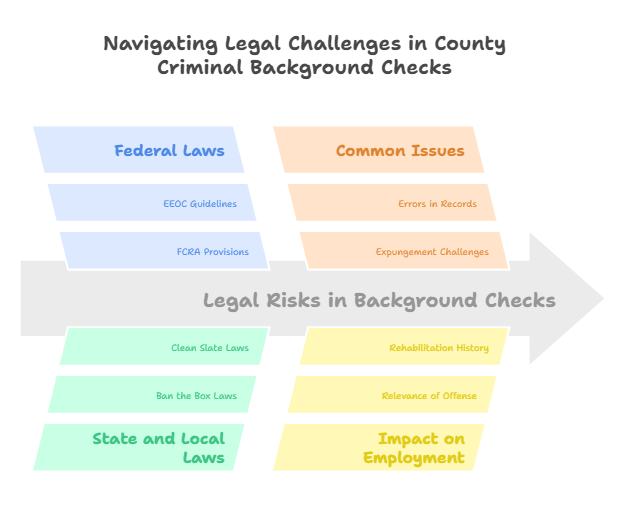
County criminal background checks, like all background screening processes, must adhere to both federal and state laws. It’s important for employers, landlords, and licensing agencies to understand these regulations to avoid legal risks and potential lawsuits.
The Fair Credit Reporting Act (FCRA)
The Fair Credit Reporting Act (FCRA) is a federal law that governs how background checks are conducted and what information can be used in hiring decisions, including county criminal background checks. The FCRA applies to employers, landlords, and any other entities that use background checks for decision-making purposes.
Key provisions of the FCRA include:
- Disclosure and Consent: Employers must obtain written consent from candidates before conducting a criminal background check. This ensures transparency and gives the individual an opportunity to review the information being reported.
- Adverse Action Notices: If a criminal background check reveals information that leads to an adverse decision (e.g., not hiring a candidate), the FCRA requires employers to provide the individual with a pre-adverse action notice. After taking the adverse action, a final adverse action notice must be sent, explaining the reasons behind the decision.
- Accuracy and Disputes: The FCRA mandates that criminal records must be accurate and up-to-date. If an individual believes there is an error in their county criminal background check, they have the right to dispute the information and request corrections.
Ban the Box Laws and Equal Employment Opportunity Commission (EEOC) Guidelines
Many states and local jurisdictions have passed ban the box laws that prohibit employers from asking about criminal history on job applications. These laws aim to reduce discrimination against individuals with criminal records by giving them a chance to be evaluated based on their qualifications first. While these laws do not eliminate background checks, they delay the inquiry until later in the hiring process, such as during the interview or after a conditional job offer.
Additionally, the Equal Employment Opportunity Commission (EEOC) has guidelines that employers must follow to ensure that criminal background checks do not disproportionately affect candidates from protected groups. Employers must use criminal background information in a way that does not violate discrimination laws, ensuring that decisions are made based on the relevance of the offense to the position, and not solely on the existence of a criminal record.
State-Specific Laws and Local Ordinances
State and local laws also influence how county criminal background checks are conducted and used. Some states have adopted laws that limit the types of criminal records that can be considered in employment and housing decisions. For example:
- In certain states, employers cannot consider arrests that did not lead to convictions.
- Some states have “clean slate” laws that allow individuals to expunge or seal certain criminal records after a period of time.
- Certain local ordinances may restrict the use of criminal records in housing applications, especially for minor offenses or convictions that are over a certain number of years old.
Understanding these local and state-specific laws is essential to ensure compliance and reduce the risk of discrimination claims or legal challenges.
Common Issues with County Criminal Background Checks
There are several common issues that individuals and organizations may encounter when conducting county criminal background checks. Addressing these issues can help prevent delays, inaccuracies, and legal concerns.
Errors in Records
One of the most common issues with county criminal background checks is the occurrence of errors in criminal records. These errors can arise from outdated records, incorrect charges, or mistaken identity. If an individual’s background check contains inaccuracies, it can lead to an adverse decision, such as being passed over for a job or denied housing.
To address this, individuals should regularly check their own criminal records, especially if they have a history of expungements or cleared offenses. Employers and landlords should verify the information and allow individuals the opportunity to correct any inaccuracies before taking adverse actions.
Expungement of Criminal Records
Expungement is the legal process by which an individual can have certain criminal records sealed or erased. Many states have laws that allow for the expungement of specific crimes after a certain period of time or under certain conditions.
However, expunged records may still be visible during county criminal background checks, depending on the state or county. It is important to understand how expungement laws work in a given jurisdiction, as they may vary. For example, some counties may still disclose expunged records to employers if the individual is applying for certain positions.
Impact of Criminal Records on Employment Opportunities
Criminal records can have a significant impact on an individual’s employment opportunities. Employers must carefully evaluate criminal background information to determine whether it is relevant to the position being applied for. Under the EEOC guidelines, employers should consider factors such as:
- The nature and severity of the offense
- How much time has passed since the offense occurred
- The applicant’s history of rehabilitation
By carefully considering these factors, employers can make more fair and responsible hiring decisions.
Frequently Asked Questions (FAQs) about County Criminal Background Checks
Here are some of the most common questions people have regarding county criminal background checks:
What is the difference between a county and state criminal background check?
A county criminal background check looks for criminal records within a specific county, providing detailed local data. A state criminal background check covers all counties within a state and includes records from across the entire state.
How far back do county criminal background checks go?
County criminal background checks typically cover offenses that occurred within a specific county and usually go back 7 to 10 years. However, some jurisdictions may extend this period depending on the nature of the offense.
Can county criminal background checks be used for employment screening?
Yes, county criminal background checks are commonly used by employers as part of the hiring process to evaluate the criminal history of applicants. However, they must comply with federal and state laws, such as the FCRA and ban the box laws.
What should I do if my county criminal background check has errors?
If you find errors in your county criminal background check, you should contact the relevant county records office to dispute the inaccuracies. You may also need to notify the company conducting the background check and provide supporting documentation.
How do county criminal background checks impact housing applications?
Landlords and property managers use county criminal background checks to assess whether an applicant poses a safety risk to other tenants or the property. Criminal history can affect the approval of rental applications, particularly if the applicant has violent or property-related offenses.
Conclusion
County criminal background checks play a critical role in a variety of sectors, especially in employment and housing decisions. By focusing on specific jurisdictions, county criminal checks offer localized, accurate, and up-to-date information that can be crucial for making informed decisions. However, these checks must be conducted in compliance with both federal and state laws, including the FCRA, ban the box laws, and EEOC guidelines. Employers, landlords, and licensing agencies must be mindful of these regulations to ensure fairness and compliance.
By utilizing county criminal background checks responsibly and staying informed about relevant laws and regulations, organizations can avoid legal pitfalls and ensure that they are making fair, accurate, and compliant decisions. Additionally, services like Rapid Hire Solutions can assist in navigating the complexities of county checks, helping organizations streamline their screening processes and maintain legal compliance.
